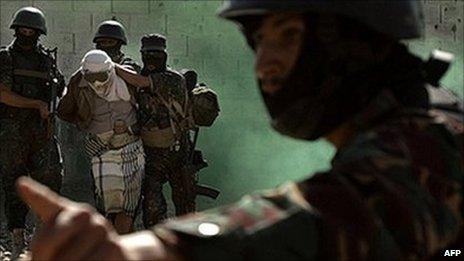Yemen: Security and the collapsing state
- Published

Yemeni security forces are receiving funding and training from abroad
A plot in October involving explosive material and US-bound cargo planes has again focused attention on Yemen as as the base of an active terrorist threat for the West. And at the start of 2011, anti-government protests and a power struggle appear to be bringing the curtain down on 32 years of Ali Abdullah Saleh's rule. But as Ginny Hill argues, the country is in crisis on several other fronts.
Earlier this year a perceived terrorism threat from Yemen prompted the UK to stop direct flights from Yemen to the UK, and is believed to have played a part in the decision to upgrade the threat of international terrorism in the UK to severe.
But in Yemen itself, public opinion is believed to be hostile to US policy in the Middle East. President Ali Abdullah Saleh's alliance with the West on counter-terrorism since 9/11 has generated widespread resentment in the country.
Many Yemenis are now worried that heavy-handed Western insistence on counter-terrorism objectives will backfire, increasing support for al-Qaeda affiliates.
One popular Yemeni sheikh proclaimed that delegates attending a meeting of international donors in London in January were planning the invasion of Yemen.
'Enormous pressure'
Yemen is the poorest country in the Middle East, with dwindling oil reserves, a growing population and a weak, incomplete central government, so donations are vital.
But although since 2006 Yemen has been pledged nearly $5bn in development aid, only a fraction of the money has been spent.
Yemen's government is unlikely to receive additional help until ministers demonstrate renewed commitment to reform and tackle corruption.
Yemen's previous record on governance reforms is poor but one Yemeni official involved in preparations for the London meeting said: "We are under enormous pressure now."
The sense of urgency that underpins the current debate about Yemen's future stems from the fact that Yemen is a collapsing state.
Oil revenues are falling, as oil production turns downward and there is currently little inward investment to support a sustainable economic base.
Terrorist networks are likely to grow as the state collapses, so an effective counter-terrorism strategy requires a long-term commitment to development, good governance and state-building.
Fragile state
Yemeni civil society organisations are calling for a comprehensive approach to the country's current challenges.
They are calling for commitments to tackle poverty, support freedom of speech and protect human rights.
Yemeni opposition groups also want foreign leaders to insist on measures to reduce internal political tensions in this fragile state.
They want the Yemeni president to launch a national dialogue that addresses the grievances of grassroots southern separatists and brings an end to the six-year civil war in the northern province of Saada.
The government claims that Saada rebels, southern secessionists and al-Qaeda affiliates belong to an "axis of evil" but local analysts warn Yemeni officials are conflating domestic dissent with terrorism in order to justify repressive measures.
In recent weeks, the Yemeni military claims to have killed AQAP's deputy commander, Said al-Shihri, and military commander, Qasim al-Raymi, but the jihadi organisation says both men are still alive.
Tackling terrorism in Yemen requires an ambitious, holistic strategy, combined with an acute instinct for the interplay of local political issues.
Success depends on a united front among Western powers, support from Yemen's neighbours and committed partners in Yemen.
Ginny Hill is an associate fellow at Chatham House in London, where she runs the Yemen Forum.
- Published21 March 2011
- Published26 March 2011